
Angela Valenzuela, Ph.D.
Professor, Director of the TCEP & Associate Vice President for School Partnerships
Angela Valenzuela is a professor in both the Cultural Studies in Education Program within the Department of Curriculum & Instruction and the Educational Policy and Planning Program within the Department of Educational Administration at the University of Texas at Austin where she also serves as the director of the University of Texas Center for Education Policy (TCEP). She served as co-editor of the Journal of Qualitative Studies in Education, as well as the Anthropology and Education Quarterly, and is a recent Fulbright Scholar (2007).
Valenzuela currently serves as Associate Vice President for University-School Partnerships at the University of Texas at Austin. Her research and teaching interests are in the sociology of education, minority youth in schools, educational policy, and urban education reform. Valenzuela is also the new director of the National Latino Education Research Agenda Project (NLERAP) that aims to create a teacher education pipeline for Latino/a youth, nationally.
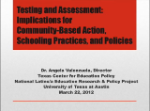 |
1. Introduction
When we talk about high-stakes testing, we are talking about consequences being tied to our uses of tests. These consequences are typically in respect to retention, promotion, and graduation. Students bear the biggest brunt of these systems. |
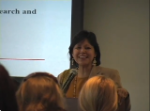 |
2. Setting the Context
There is a whole segment of the student population, regardless of class and race that will never test well on standardized exams. For a grade in a course to be conflated with a standardized test score is unprecedented in the history of testing. |
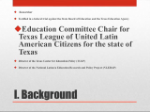 |
3. Coalitions and Engagement in Policy Issues
As researchers, unfortunately, we tend to come in at the end of the policy-making process when we try to determine if a policy is good, bad, implemented well, or promoting sufficient equity. |
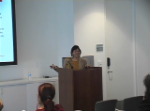 |
4. Myths behind Standardized Testing, Part 1
Test developers assert that you should never use their tests in the way that we are in fact using them, that we should not use them as the primary or sole determinant for making high stakes decisions on behalf of children. |
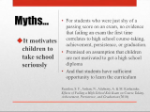 |
5. Myths behind Standardized Testing, Part 2
There are multiple agendas in the use of standardized tests. The corporate sector is highly motivated by the money there is for testing. There are also beliefs and ideologies that attempt to separate the better students, these are notions of merit are very deep within our culture. We are a country that is very interested in merit-based systems. |
 |
6. Building a Constituency
Standardizing children is a subtractive, dehumanizing logic that is injurious to children’s spirits and life chances. What do we do? We build a constituency for public education and we look at formal and informal political action that our history tells us has worked. |
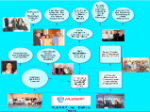 |
7. A Partnership Model for Change
A curriculum for higher education demands a constituency that is partnership-based and rooted in the community. Teachers serving these communities can get prepared with a social justice curriculum that focuses on culture but also on politics, policy, and political awareness through signature courses. |